高校英语教学研究论文10篇
- 格式:doc
- 大小:51.99 KB
- 文档页数:40
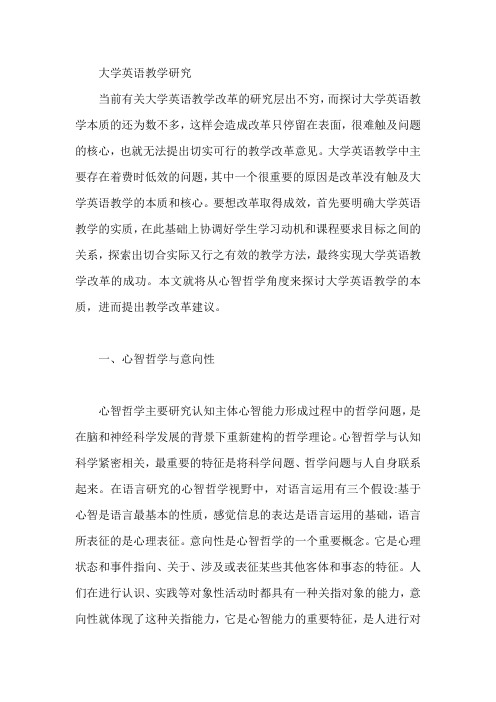
大学英语教学研究当前有关大学英语教学改革的研究层出不穷,而探讨大学英语教学本质的还为数不多,这样会造成改革只停留在表面,很难触及问题的核心,也就无法提出切实可行的教学改革意见。
大学英语教学中主要存在着费时低效的问题,其中一个很重要的原因是改革没有触及大学英语教学的本质和核心。
要想改革取得成效,首先要明确大学英语教学的实质,在此基础上协调好学生学习动机和课程要求目标之间的关系,探索出切合实际又行之有效的教学方法,最终实现大学英语教学改革的成功。
本文就将从心智哲学角度来探讨大学英语教学的本质,进而提出教学改革建议。
一、心智哲学与意向性心智哲学主要研究认知主体心智能力形成过程中的哲学问题,是在脑和神经科学发展的背景下重新建构的哲学理论。
心智哲学与认知科学紧密相关,最重要的特征是将科学问题、哲学问题与人自身联系起来。
在语言研究的心智哲学视野中,对语言运用有三个假设:基于心智是语言最基本的性质,感觉信息的表达是语言运用的基础,语言所表征的是心理表征。
意向性是心智哲学的一个重要概念。
它是心理状态和事件指向、关于、涉及或表征某些其他客体和事态的特征。
人们在进行认识、实践等对象性活动时都具有一种关指对象的能力,意向性就体现了这种关指能力,它是心智能力的重要特征,是人进行对象性活动的首要条件。
心智首先关指一个对象,并对其表现出希翼、憎恶、喜爱、谴责等不同的心理状态,从而与世界联系起来。
意向性是一次意识活动的发端,并贯穿于这一活动的整个过程。
意向性可体现为意识活动的一种“工具”,是意识观照事物、事件、事态时所展现出的一种体现“利己”的取舍倾向,表现为意识活动中对对象的注意、过滤、选择、表征时的心理状态,并呈现判断、评价、表征的功能。
意向性包含两方面内容:意向内容和意向态度。
意向内容就是意识活动以什么为其内容和这样的内容如何归结为一定的语言表征方式。
意向态度指用怎样的心理状态、心理估量、心理取向来关指意向内容,即意向内容受主体的意向态度的处理。

大学英语专业论文六篇高校英语专业论文范文1(一)职后培训短缺高校英语老师的职后培训状况不容乐观。
以笔者所在学校为例,本院共有在岗并从事高校英语课程教学的老师56人,每工作5年有1次进修经受(包括攻读学位、访学、留学,进修时间不少于1年)的老师不到10%。
35岁以下的老师除攻读学位而外,有外出进修经受的人次为1人。
教龄达20年以上的高校英语老师16人,近10年内进修过的比例为43.7%;教龄在10年至15年的老师(攻读学位除外)13人中仅2人有进修经受,笔者本人工作14年多次申请进修未果。
从课间休息时老师之间的沟通中获悉,多数高校英语老师都有外出进修的剧烈愿望,但皆因各种缘由未能如愿以偿。
主要缘由有两项:一是高校高校英语教学工作任务太重不能放人,除非攻读学位,"工作量大,教学任务繁重是阻碍高校英语老师自身进展的客观缘由'[2];二是接受老师进修的高校少且每年可接收的老师数量有限。
其余渠道的进修培训不多,"高校英语老师培训网'只有"培训负责人和技术负责人'能申请注册,受众面比较窄。
(二)教学颇受诟病社会上多年来盛行不衰的形形的英语培训学校、辅导班,以及讨论中大量消失的"哑巴英语'和"聋子英语'等词汇使得广阔英语老师颇受诟病。
将英语辅导学校的盛行归因于学校英语教学的不力好像有几分道理。
高校生参加高校英语教学状况调查时亦做出类似反馈,将胜利归因于自身的努力,而将失败归因于高校英语老师的教学不得法[3]。
此处暂不考虑这样的归因是否合乎规律,但高校英语老师无论如何是脱不了干系的。
首先,绝大多数中学校英语老师是高等教育培育的。
其次,作为"哑巴英语'和"聋子英语'携带者的高校生们刚走出高校校门即被识破,充分说明高校英语的教学质量如何。
再者,为提高高校英语教学质量,21世纪以来,高校英语教学改革的不断推动和是否广泛推广ESP专业英语教学的争辩热点都不约而同地指向高校英语老师专业化进展的必要性和紧迫性。
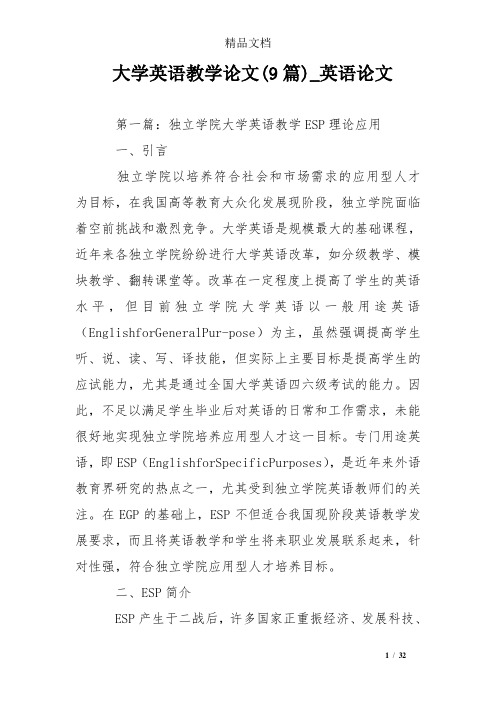
大学英语教学论文(9篇)_英语论文第一篇:独立学院大学英语教学ESP理论应用一、引言独立学院以培养符合社会和市场需求的应用型人才为目标,在我国高等教育大众化发展现阶段,独立学院面临着空前挑战和激烈竞争。
大学英语是规模最大的基础课程,近年来各独立学院纷纷进行大学英语改革,如分级教学、模块教学、翻转课堂等。
改革在一定程度上提高了学生的英语水平,但目前独立学院大学英语以一般用途英语(EnglishforGeneralPur-pose)为主,虽然强调提高学生听、说、读、写、译技能,但实际上主要目标是提高学生的应试能力,尤其是通过全国大学英语四六级考试的能力。
因此,不足以满足学生毕业后对英语的日常和工作需求,未能很好地实现独立学院培养应用型人才这一目标。
专门用途英语,即ESP(EnglishforSpecificPurposes),是近年来外语教育界研究的热点之一,尤其受到独立学院英语教师们的关注。
在EGP的基础上,ESP不但适合我国现阶段英语教学发展要求,而且将英语教学和学生将来职业发展联系起来,针对性强,符合独立学院应用型人才培养目标。
二、ESP简介ESP产生于二战后,许多国家正重振经济、发展科技、加强国际间交流。
英语已被认为是科技和商贸领域里的国际语言,因此,人们学习英语的目的十分明确,即掌握英语为自己所从事的专业服务。
随着社会发展,ESP成为社会语言学关于变体理论、功能分类理论、语域理论在外语教学中的具体运用。
在大学英语教学中,和EGP不同,ESP是为了满足学习者特定的学习要求而与某种特定职业或学科相关的英语学习。
除了基本的语言技能之外,在内容方面与特定职业或专业相关,更具有专业内涵性和实际应用性,如旅游英语、商务英语、法律英语、计算机英语等。
因此,EGP教授的是英语语言的普遍现象,而ESP是以EGP为基础,在EGP 的基础上不同专业的变体,是EGP发展的高级阶段。
三、ESP理论在独立学院中的应用分析(一)学生分析因定位和自身特点,独立学院生源质量与普通高校相比存在一定的差距。

高职院校英语教学论文10篇第一篇:高职行业英语教学发展路径研究一、引言高职院校以培养高等技术应用性专业人才为主要教学目的,以此为主线设计提升学生的知识、能力、素质结构的培养方案;以适应社会需求为教学目标,让学生具备专业的理论知识、知识面宽阔、实际应用技术能力强;以“应用”为教学遵旨,创建英语教学体系。
英语应用能力是培养职业核心能力的关键环节,所以,高职行业英语教学在教学内容、模式、方式、考核及评价等方面,必须衔接好学生的专业教育,以实际运用、职场交际为教学遵旨,培养学生在未来职业工作中熟练应用英语,处理具体问题的能力。
二、高职院校实施行业英语教学的必要性以当前的职业教育发展状况来讲,社会经济的迅速发展,使职业教育逐步从培养学生单一的职业技能,转换为可持续发展职业核心能力的提高。
职业核心能力的培养其中的关键部分即为英语应用能力的教学,实际的工作岗位需求的是能够应用英语处理问题,能够使用英语进行交流和沟通,翻译和阅读有关的产品技术,接洽处理有关的英语业务。
所以,提高学生的英语应用能力,是高职院校综合职业能力教学的重中之重。
三、高职行业英语教学的现状第一,高职院校对行业英语没有充分的认识。
由于高职院校对行业英语没有足够的重视,学生的学习目的是为应付英语考试,领取等级证书,疏忽了专业的行业英语学习。
另外,高职院校开设公共英语课程,主要是培养学生的基本语言知识,这些技能的培养只适合于普通的语言沟通。
高职院校虽开设了行业英语课程,但达不到行业英语学习要求。
第二,行业英语课程教材滞后,教学质量低。
高职行业英语教材并不成熟,仍处于初级阶段,没有具体专业的行业英语教材,也没有实施有效的教学大纲。
行业英语教材编写的难题主要体现在,教材本身必须紧随市场经济的变化,内容具体丰富、难度适中、适应具体工作需求、全方位涉及行业知识,且必须具备实用性和可操作性。
但是,目前高职院校的行业英语教材内容脱离现代经济的发展需求,起不到培养实际行业英语应用能力。

大学生英语教学论文一、XX络多媒体英语教学模式的优劣大量使用下载课件,不能很好的发挥教师的主观能动性。
有一些教师在实际教学过程中,在XX上下载相关课件,每位教师都已形成自己的教学风格。
学生因为不适应会影响教学的效果。
注重课件的华丽却忽视教学内容。
一些教师在设计课件时,过分运用现代XX络技术,过分注重课件的花哨,把本来简明的内容搞得学生满头雾水,不知所措;或是使学生注意力被色彩及动画所吸引,忽略课堂应学习的知识。
事实上,学生无意注意过多,对教学干扰过大,学生对课堂上缺少语言训练,即使有训练,也很不足。
使用过多多媒体,教师的作用被削弱。
有些教师为了吸引学生的注意力,在一堂课中过多地使用多媒体。
就会把本应由教师讲述的内容变为多媒体演示,把师生之间的交流变为冷冰冰的人机对话。
二、传统英语教学模式的优劣1.传统英语教学模式的优点教师在课堂上可根据学生实际因材施教。
在教学过程中,教师根据学生实际水平、听课反应、和接受能力等进行生动灵活的讲解,以幸免课件的固定的内容和难度,更利于学生的理解和掌握。
教师和学生互动多,便于英语学科特点教学,也利于英语学习。
师生互动多交流,教师可根据学生接受难易的表情、笔记多少,灵活的改变教学方法,不受设备的限制,便于操控课堂,利用情感来拉近师生距离,使学生听课更认真,精力更集中,教学效果更好。
学生练习机会多,有利于掌握巩固所学的知识。
因为学生只看课本知识,对知识本身较为注重,练习机会多,适合英语学科教学多练易掌握特点。
2.传统英语教学模式的缺点教学方法呆板,教学过程程序化。
主要是以教师讲解为主,靠粉笔、黑板和课本来接受知识,教师填鸭式教学,学生被动接受,过程枯噪无味,学生教师无激情,会使学生失去学习英语的兴趣。
教学模式单一,教学内容匮乏,形式不够丰富多彩。
只是利用口头语言和有限板书,不会提供更为丰富、有趣的知识,来满足知识爆炸时代的现代大学生的需要。
三、XX络多媒体英语教学模式和传统教学模式相结合1.明确教学目的,确立学生主体教师主导地位教学过程要以学生为主体,充分发挥教师的导向作用,多媒体教学只是一个手段,教学辅助作用不会改变,也不会代替教师的知识传授者的作用。

英语教学法论文10篇无论是在学习还是在工作中,大家都接触过论文吧,借助论文可以有效训练我们运用理论和技能解决实际问题的的能力。
写起论文来就毫无头绪?下面是书包范文为您带来的英语教学法论文10篇,希望能够给朋友们的写作带来一定的启发。
【摘要】随着社会文化学科的不断发展和进步,针对社会文化学的相关研究也不断增多,在社会学领域内的文化学科强调在社会和文化环境下以语言和社会活动作为中介来实现人们对知识的学习,可以看到,英语教学在一定程度上也是社会文化学领域内的一部分,因而本文通过研究英语教学和社会文化学的相关要点明确如何应用社会文化学在实现英语教学。
【关键词】社会文化学;英语教学引言近年来,随着国际间教育领域合作的加强,针对英语语言教学的全新看法颠覆了传统教育学视阙下英语教学作为单一语言教学的观点,而将社会文化属性加诸于英语语言教学。
因而在此一现实环境下,通过全新的教学方法与教学实例来促进英语教学在社会文化要素方面的累积可谓十分重要,社会文化学强调对语言体系的学习过程,同时加重了任务型教学的比例。
这些变化都催生了英语教学的现实进展,同时也为社会文化学视角下的英语教学的研究提供了更多的可能性。
一、英语教学的社会文化学属性二、社会文化学在英语教学中的应用维果斯基的社会文化学在英语教学中的研究与应用已屡见不鲜,比如英国学者Lantolf等人便认为学习者在交际情景中所进行的大部分交际活动都与其自身的需求密切相关,他们使用语言来处理其相应的事务和遭遇。
在国内类似的应用也早有研究可查,主要体现在对我国英语教学体制和英语教学方法的方面,比如修订的英语教学大纲就针对英语教学实际提出了应该完善以英语培养为核心、加强英语语言的应用和基本技能的培养,侧重于学生通过英语的学习可以达成的解决问题的能力而不仅仅是英语学习相关的知识性技能。
近年来,英语教学在英语学习大纲的变化之下也相应的产生了较多变化,比如在实际教学中更加注重结合本土社会文化以及英语语言文化进行教学,注重教学环节的自由、平等,减少填鸭式教学方式的应用,在尊重学生自我学习习惯和自我实践方式的基础上引导性的进行英语教学,在这一过程中减轻了英语教学的固有负担,注重学生的综合能力培养。
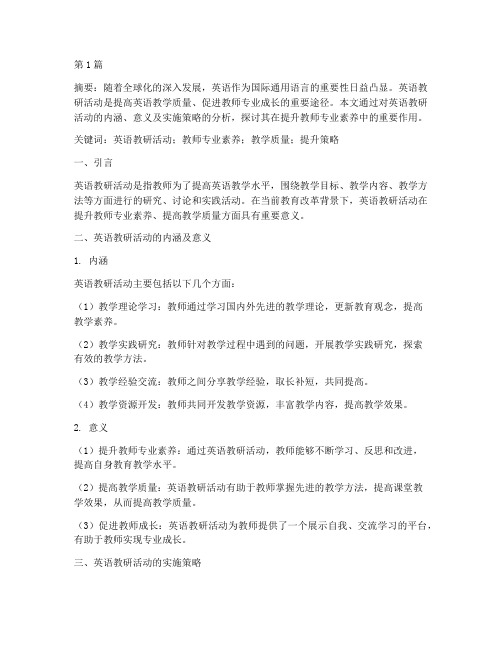
第1篇摘要:随着全球化的深入发展,英语作为国际通用语言的重要性日益凸显。
英语教研活动是提高英语教学质量、促进教师专业成长的重要途径。
本文通过对英语教研活动的内涵、意义及实施策略的分析,探讨其在提升教师专业素养中的重要作用。
关键词:英语教研活动;教师专业素养;教学质量;提升策略一、引言英语教研活动是指教师为了提高英语教学水平,围绕教学目标、教学内容、教学方法等方面进行的研究、讨论和实践活动。
在当前教育改革背景下,英语教研活动在提升教师专业素养、提高教学质量方面具有重要意义。
二、英语教研活动的内涵及意义1. 内涵英语教研活动主要包括以下几个方面:(1)教学理论学习:教师通过学习国内外先进的教学理论,更新教育观念,提高教学素养。
(2)教学实践研究:教师针对教学过程中遇到的问题,开展教学实践研究,探索有效的教学方法。
(3)教学经验交流:教师之间分享教学经验,取长补短,共同提高。
(4)教学资源开发:教师共同开发教学资源,丰富教学内容,提高教学效果。
2. 意义(1)提升教师专业素养:通过英语教研活动,教师能够不断学习、反思和改进,提高自身教育教学水平。
(2)提高教学质量:英语教研活动有助于教师掌握先进的教学方法,提高课堂教学效果,从而提高教学质量。
(3)促进教师成长:英语教研活动为教师提供了一个展示自我、交流学习的平台,有助于教师实现专业成长。
三、英语教研活动的实施策略1. 明确教研目标(1)提高教师英语教学素养:通过教研活动,使教师掌握先进的教学理念、方法和技巧。
(2)提升课堂教学效果:通过教研活动,使教师能够运用有效的教学方法,提高课堂教学效果。
(3)促进教师专业成长:通过教研活动,使教师实现自我提升,成为优秀的英语教师。
2. 制定教研计划(1)确定教研主题:围绕英语教学中的重点、难点和热点问题,确定教研主题。
(2)安排教研活动:根据教研主题,安排形式多样的教研活动,如讲座、研讨、观摩等。
(3)明确教研时间:确保教研活动有足够的时间,提高教研效果。
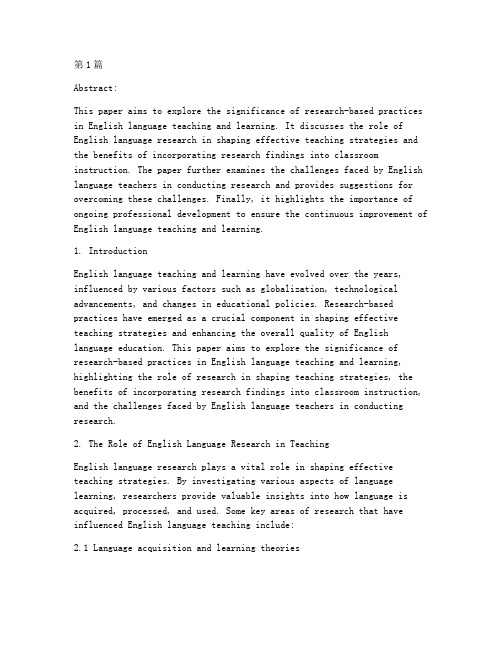
第1篇Abstract:This paper aims to explore the significance of research-based practices in English language teaching and learning. It discusses the role of English language research in shaping effective teaching strategies and the benefits of incorporating research findings into classroom instruction. The paper further examines the challenges faced by English language teachers in conducting research and provides suggestions for overcoming these challenges. Finally, it highlights the importance of ongoing professional development to ensure the continuous improvement of English language teaching and learning.1. IntroductionEnglish language teaching and learning have evolved over the years, influenced by various factors such as globalization, technological advancements, and changes in educational policies. Research-based practices have emerged as a crucial component in shaping effective teaching strategies and enhancing the overall quality of English language education. This paper aims to explore the significance of research-based practices in English language teaching and learning, highlighting the role of research in shaping teaching strategies, the benefits of incorporating research findings into classroom instruction, and the challenges faced by English language teachers in conducting research.2. The Role of English Language Research in TeachingEnglish language research plays a vital role in shaping effective teaching strategies. By investigating various aspects of language learning, researchers provide valuable insights into how language is acquired, processed, and used. Some key areas of research that have influenced English language teaching include:2.1 Language acquisition and learning theoriesResearch on language acquisition and learning theories has contributed to the development of various teaching approaches, such as the Communicative Approach, the Task-Based Language Teaching Approach, and the Sociocultural Approach. These approaches emphasize the importance of meaningful communication, interaction, and collaboration in language learning.2.2 Classroom practicesResearch on classroom practices has provided valuable information on how to create effective learning environments, such as incorporating technology, promoting learner autonomy, and assessing student progress. These findings have helped teachers design engaging and effective lesson plans.2.3 Assessment and evaluationResearch on assessment and evaluation has highlighted the importance of formative and summative assessment in language learning. It has also emphasized the need for diverse and valid assessment methods to measure students' language proficiency accurately.3. Benefits of Incorporating Research Findings into ClassroomInstructionIncorporating research findings into classroom instruction has numerous benefits for both teachers and students. Some of these benefits include:3.1 Enhanced learning outcomesResearch-based practices have been shown to improve students' language proficiency and learning outcomes. By implementing evidence-based teaching strategies, teachers can help students achieve their learning goals more effectively.3.2 Increased teacher efficacyWhen teachers are aware of the latest research findings in English language teaching, they feel more confident in their teaching practices.This increased efficacy can lead to higher job satisfaction and a more positive learning environment.3.3 Continuous improvementIncorporating research findings into classroom instruction encourages teachers to reflect on their teaching practices and make necessary adjustments. This continuous improvement process contributes to the overall quality of English language education.4. Challenges in Conducting Research in English Language TeachingDespite the numerous benefits of research-based practices, English language teachers often face several challenges in conducting research. Some of these challenges include:4.1 Time constraintsEnglish language teachers are often overwhelmed with teaching responsibilities, leaving little time for research activities.4.2 Limited access to resourcesAccess to research materials, such as academic journals and conferences, can be limited for teachers in certain settings.4.3 Lack of research skillsMany teachers may lack the necessary research skills to conducteffective research in their classrooms.5. Overcoming Challenges and Promoting Research-Based PracticesTo overcome the challenges faced by English language teachers in conducting research, the following suggestions can be considered:5.1 Providing professional development opportunitiesSchools and educational institutions should offer professional development workshops and courses to help teachers develop their research skills.5.2 Creating a supportive research cultureAdministrators and colleagues should encourage teachers to engage in research activities and provide support in terms of time and resources.5.3 Fostering collaboration among teachersCollaborative research projects can help teachers share their experiences and learn from each other, thereby enhancing their research capabilities.6. ConclusionResearch-based practices play a crucial role in enhancing English language teaching and learning. By incorporating research findings into classroom instruction, teachers can design effective teaching strategies and improve students' learning outcomes. Although challenges exist, ongoing professional development and collaboration among teachers can help overcome these obstacles. Ultimately, the continuous improvement of English language teaching and learning relies on the commitment of teachers to engage in research and adapt their teaching practices accordingly.第2篇Abstract:This paper aims to explore the effectiveness of collaborative教研activities in enhancing English language teaching. By analyzing various 教研活动的设计、 implementation, and outcomes, this study aims to provide insights into how these activities can contribute to the professional development of English language teachers and improve the overall quality of English language instruction. The paper is structured into four main sections: Introduction, Literature Review, Methodology, and Discussion and Conclusion.Introduction:The field of English language teaching (ELT) is constantly evolving, with new methodologies, technologies, and pedagogical approachesemerging regularly. To keep up with these changes, English language teachers need to engage in continuous professional development (CPD) activities. One such activity is collaborative教研 activities, which involve teachers working together to share ideas, discuss challenges,and develop innovative teaching strategies. This paper examines the role of collaborative教研活动在提升英语教学质量中的作用,并探讨其对教师专业发展和学生语言学习成果的影响。

英语教学论文10篇英语教学论文10篇1在英语教学中培养学生良好的素质在深化教育改革过程中,人们已认识到小学基础教育应以素质教育为目标,通俗地说,就是要帮助小学生学会生活、学会学习和学会做人,为学生走向生活、走向社会以及继续学习打下扎实的基础。
素质教育应贯彻在学校各项工作和各科教学中。
英语作为一门基础学科,如何进行素质教育?我体会到:在英语教学中广泛开展丰富多彩的英语活动,是培养小学生良好素质的有效途径。
一、开展英语活动有利于培养学生热情、开朗的性格,良好的情趣,健康的情感和善于交际的能力。
语言是人的心理活动最重要的外部表现。
因而,对学徒进行语言训练有助于丰富学生的心理活动。
小学英语的教学目标主要在于初步培养学生的英语交际能力。
交际离不开活动,因此,我在英语教学中经常开展诸如分角色对话,做捉迷藏、“看谁反应快”、“谁是问不倒的小博士”等各种英语游戏,排演英语儿童节目,朗诵诗歌,唱英语歌,邀请外国朋友来校或带学生到有外国人的公共场所,让学生学着用英语和外国朋友交谈,等等。
少年獐有爱看爱听爱说的特点,他们都能很投入地参加这此有趣的英语活动。
去年五月,我邀请了英国的希尔夫妇来校和学生联欢。
同学们有礼貌地用“Welcome to China! ““Welcome to our school!“等情真意切的语言欢迎他们。
听他们介绍了情况后,同学们热切地向他们提了许多问题:“Do you like China?“ “How many people are there in your family?“希尔夫妇在回答问题后,也向同学们提了一些问题.同学们争先恐后举手,清楚流利地一一作答.同学们还三两人一组主动地走到客人面前,先自我介绍: “My name is Wang Xi. My English name is Mike.“然后介绍自己的同学: “This is Xing Li“两人一起说:“We are classmates.“然后拉着客人的手:“Nice to meet you!“再问:“Could we be friends?““Good!“ “Well done!“希尔夫妇连声赞叹道.最后同学们热情洋溢地献上自己制作的小手工、小作品,或是小工艺品,•还没忘记再说上几句英语:“Do you like it?““Welcome again!“同学们惊喜地发现:外国人讲话我们大部分能听懂,我们讲的他们也能听懂,真有趣.学生亲身参加活动能帮助他们克服畏难情绪,激发主动积极的学习精神.有些原来性格腼腆、站起来说话就脸红心跳的学生,通过以上英语活动的锻炼,已能经常自告奋勇地出来对话、表演了。
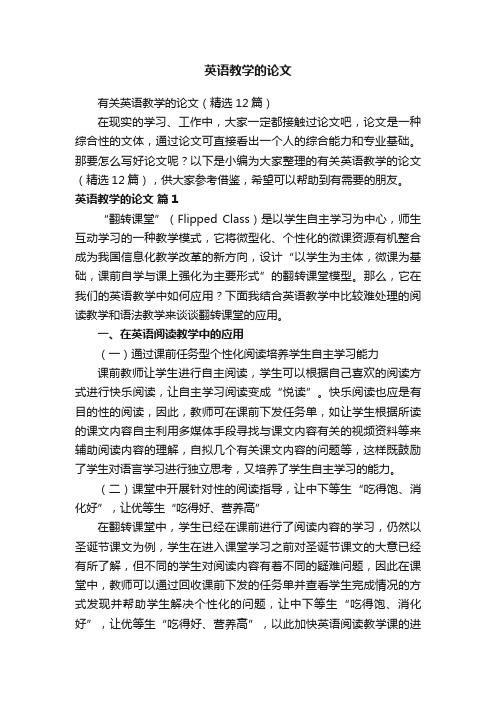
英语教学的论文有关英语教学的论文(精选12篇)在现实的学习、工作中,大家一定都接触过论文吧,论文是一种综合性的文体,通过论文可直接看出一个人的综合能力和专业基础。
那要怎么写好论文呢?以下是小编为大家整理的有关英语教学的论文(精选12篇),供大家参考借鉴,希望可以帮助到有需要的朋友。
英语教学的论文篇1“翻转课堂”(Flipped Class)是以学生自主学习为中心,师生互动学习的一种教学模式,它将微型化、个性化的微课资源有机整合成为我国信息化教学改革的新方向,设计“以学生为主体,微课为基础,课前自学与课上强化为主要形式”的翻转课堂模型。
那么,它在我们的英语教学中如何应用?下面我结合英语教学中比较难处理的阅读教学和语法教学来谈谈翻转课堂的应用。
一、在英语阅读教学中的应用(一)通过课前任务型个性化阅读培养学生自主学习能力课前教师让学生进行自主阅读,学生可以根据自己喜欢的阅读方式进行快乐阅读,让自主学习阅读变成“悦读”。
快乐阅读也应是有目的性的阅读,因此,教师可在课前下发任务单,如让学生根据所读的课文内容自主利用多媒体手段寻找与课文内容有关的视频资料等来辅助阅读内容的理解,自拟几个有关课文内容的问题等,这样既鼓励了学生对语言学习进行独立思考,又培养了学生自主学习的能力。
(二)课堂中开展针对性的阅读指导,让中下等生“吃得饱、消化好”,让优等生“吃得好、营养高”在翻转课堂中,学生已经在课前进行了阅读内容的学习,仍然以圣诞节课文为例,学生在进入课堂学习之前对圣诞节课文的大意已经有所了解,但不同的学生对阅读内容有着不同的疑难问题,因此在课堂中,教师可以通过回收课前下发的任务单并查看学生完成情况的方式发现并帮助学生解决个性化的问题,让中下等生“吃得饱、消化好”,让优等生“吃得好、营养高”,以此加快英语阅读教学课的进程,提升阅读效率。
(三)运用开放性、拓展性的问题机制激活学生个性化的思维,让课堂成为学生展示的主人翻转课堂中的英语阅读教学,首先课前已基本扫清了课文翻译障碍,课堂中教师不必将理解课文大意和知识点的讲解放在首位,所以课堂中的语言学习就应该聚焦于对文章话题的深度讨论和语言点的课外拓展。
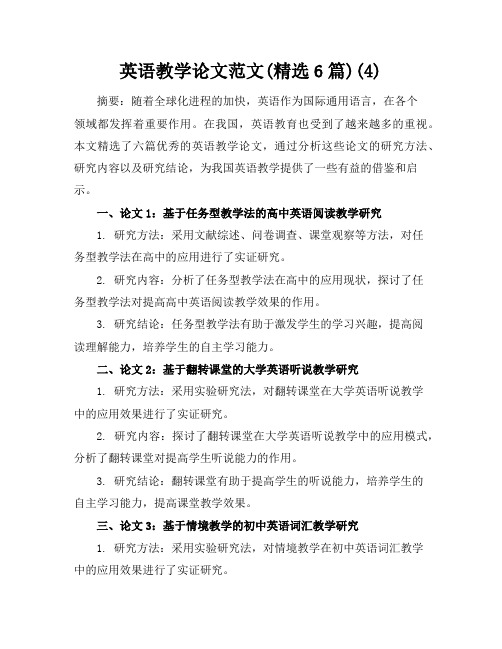
英语教学论文范文(精选6篇)(4)摘要:随着全球化进程的加快,英语作为国际通用语言,在各个领域都发挥着重要作用。
在我国,英语教育也受到了越来越多的重视。
本文精选了六篇优秀的英语教学论文,通过分析这些论文的研究方法、研究内容以及研究结论,为我国英语教学提供了一些有益的借鉴和启示。
一、论文1:基于任务型教学法的高中英语阅读教学研究1. 研究方法:采用文献综述、问卷调查、课堂观察等方法,对任务型教学法在高中的应用进行了实证研究。
2. 研究内容:分析了任务型教学法在高中的应用现状,探讨了任务型教学法对提高高中英语阅读教学效果的作用。
3. 研究结论:任务型教学法有助于激发学生的学习兴趣,提高阅读理解能力,培养学生的自主学习能力。
二、论文2:基于翻转课堂的大学英语听说教学研究1. 研究方法:采用实验研究法,对翻转课堂在大学英语听说教学中的应用效果进行了实证研究。
2. 研究内容:探讨了翻转课堂在大学英语听说教学中的应用模式,分析了翻转课堂对提高学生听说能力的作用。
3. 研究结论:翻转课堂有助于提高学生的听说能力,培养学生的自主学习能力,提高课堂教学效果。
三、论文3:基于情境教学的初中英语词汇教学研究1. 研究方法:采用实验研究法,对情境教学在初中英语词汇教学中的应用效果进行了实证研究。
2. 研究内容:探讨了情境教学在初中英语词汇教学中的应用模式,分析了情境教学对提高学生词汇掌握程度的作用。
3. 研究结论:情境教学有助于提高学生的词汇掌握程度,培养学生的语言运用能力,提高课堂教学效果。
四、论文4:基于项目式学习的大学英语写作教学研究1. 研究方法:采用实验研究法,对项目式学习在大学英语写作教学中的应用效果进行了实证研究。
2. 研究内容:探讨了项目式学习在大学英语写作教学中的应用模式,分析了项目式学习对提高学生写作能力的作用。
3. 研究结论:项目式学习有助于提高学生的写作能力,培养学生的创新思维和团队协作能力,提高课堂教学效果。
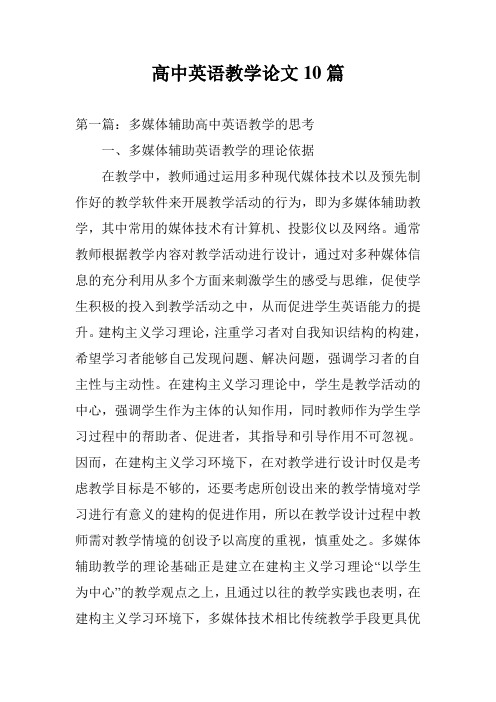
高中英语教学论文10篇第一篇:多媒体辅助高中英语教学的思考一、多媒体辅助英语教学的理论依据在教学中,教师通过运用多种现代媒体技术以及预先制作好的教学软件来开展教学活动的行为,即为多媒体辅助教学,其中常用的媒体技术有计算机、投影仪以及网络。
通常教师根据教学内容对教学活动进行设计,通过对多种媒体信息的充分利用从多个方面来刺激学生的感受与思维,促使学生积极的投入到教学活动之中,从而促进学生英语能力的提升。
建构主义学习理论,注重学习者对自我知识结构的构建,希望学习者能够自己发现问题、解决问题,强调学习者的自主性与主动性。
在建构主义学习理论中,学生是教学活动的中心,强调学生作为主体的认知作用,同时教师作为学生学习过程中的帮助者、促进者,其指导和引导作用不可忽视。
因而,在建构主义学习环境下,在对教学进行设计时仅是考虑教学目标是不够的,还要考虑所创设出来的教学情境对学习进行有意义的建构的促进作用,所以在教学设计过程中教师需对教学情境的创设予以高度的重视,慎重处之。
多媒体辅助教学的理论基础正是建立在建构主义学习理论“以学生为中心”的教学观点之上,且通过以往的教学实践也表明,在建构主义学习环境下,多媒体技术相比传统教学手段更具优势,教学效果更佳。
根据语言习得理论,语言学习者语言的习得是一种下意识掌握语言的过程,大多数语言习得者的学习母语的目的是为了交际时能够正确运用语言来表达自己。
语言习得理论下,学习者要想掌握语言、习得语言,首先要理解语言、听懂语言,也就是“可理解输入”。
实践表明,外语教学的效果在一定程度上取决于语言输入的质量,要想掌握一门语言,大量的可理解输入是必不可少的。
而要想让学习者在外语学习中进行大量的语言输入,就需要扩大学习者与目标语言的接触面,为其营造一个尽可能逼真的语言学习氛围,让学生在特定的语言环境中不知不觉的进行语言学习。
现代多媒体技术拥有多种信息功能,将其运用到外语学习中,正好满足外语教学进行大量语言输入的要求,且通过其所营造出来的语言学习环境,更适合学生进行外语学习。
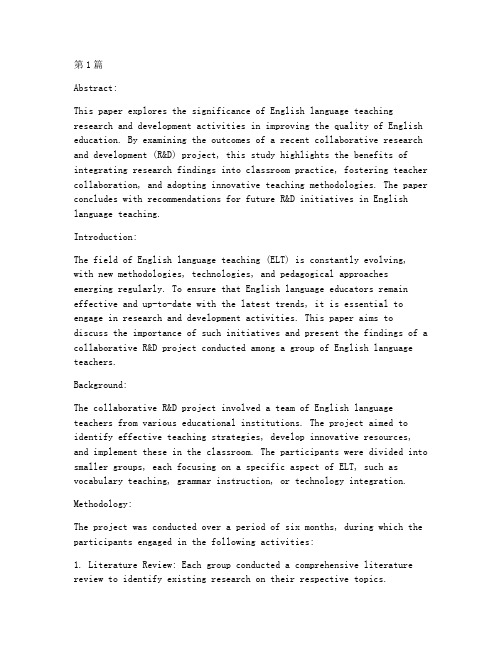
第1篇Abstract:This paper explores the significance of English language teaching research and development activities in improving the quality of English education. By examining the outcomes of a recent collaborative research and development (R&D) project, this study highlights the benefits of integrating research findings into classroom practice, fostering teacher collaboration, and adopting innovative teaching methodologies. The paper concludes with recommendations for future R&D initiatives in English language teaching.Introduction:The field of English language teaching (ELT) is constantly evolving, with new methodologies, technologies, and pedagogical approaches emerging regularly. To ensure that English language educators remain effective and up-to-date with the latest trends, it is essential to engage in research and development activities. This paper aims to discuss the importance of such initiatives and present the findings of a collaborative R&D project conducted among a group of English language teachers.Background:The collaborative R&D project involved a team of English language teachers from various educational institutions. The project aimed to identify effective teaching strategies, develop innovative resources, and implement these in the classroom. The participants were divided into smaller groups, each focusing on a specific aspect of ELT, such as vocabulary teaching, grammar instruction, or technology integration.Methodology:The project was conducted over a period of six months, during which the participants engaged in the following activities:1. Literature Review: Each group conducted a comprehensive literature review to identify existing research on their respective topics.2. Workshops and Seminars: Regular workshops and seminars were held to share insights and discuss the findings of the literature review.3. Resource Development: Based on the research findings, theparticipants developed innovative teaching resources, such as lesson plans, handouts, and interactive materials.4. Classroom Implementation: The resources were implemented in the classroom, with the participants collecting data on student performance and feedback from both students and colleagues.5. Reflection and Analysis: The data collected was analyzed, and the participants reflected on the effectiveness of the new teaching strategies and resources.Findings:The findings of the project revealed several key insights:1. Integration of Research and Practice: The integration of research findings into classroom practice led to a significant improvement in student learning outcomes. Teachers who adopted evidence-based teaching strategies reported higher levels of student engagement and achievement.2. Teacher Collaboration: The collaborative nature of the project fostered a sense of community among the participants. Teachers learned from each other's experiences and developed a shared understanding of effective ELT practices.3. Innovation in Teaching Methodologies: The development of innovative teaching resources and strategies contributed to a more dynamic and engaging learning environment. Teachers reported that their students were more motivated and excited about learning English.4. Professional Development: The project provided an opportunity for the participants to engage in continuous professional development. They gained new skills, knowledge, and confidence in their teaching abilities.Discussion:The findings of this study support the importance of research and development activities in English language teaching. By engaging in such initiatives, educators can:- Stay informed about the latest research and trends in ELT.- Develop and implement evidence-based teaching strategies.- Foster a culture of collaboration and professional growth among teachers.- Improve the overall quality of English education.Conclusion:The collaborative R&D project presented in this paper has demonstrated the potential of research and development activities in enhancing English language teaching. By integrating research findings into classroom practice, fostering teacher collaboration, and adopting innovative teaching methodologies, educators can create a more effective and engaging learning environment for their students. As such, it is recommended that educational institutions continue to invest in research and development initiatives to ensure the ongoing improvement of English language education.Recommendations for Future R&D Initiatives:1. Establish a dedicated R&D team: Create a dedicated team of educators and researchers to oversee and facilitate R&D projects.2. Provide funding and resources: Allocate sufficient funding and resources to support R&D initiatives, including access to research materials, technology, and training opportunities.3. Encourage interdisciplinary collaboration: Promote collaboration between ELT professionals, researchers, and other stakeholders to leverage diverse perspectives and expertise.4. Share research findings: Establish platforms for sharing research findings and best practices among educators to foster a culture of continuous improvement.5. Monitor and evaluate outcomes: Regularly monitor and evaluate the outcomes of R&D projects to ensure their effectiveness and make necessary adjustments as needed.By implementing these recommendations, educational institutions can further enhance the quality of English language teaching and prepare students for success in a globalized world.第2篇Abstract:The purpose of this paper is to explore the effectiveness ofcollaborative教研 activities in enhancing English language teaching. Through an analysis of various教研模式,the paper aims to highlight the benefits of such activities in fostering professional development, improving teaching strategies, and ultimately enhancing student learning outcomes. This study involves a review of existing literature, case studies, and personal reflections to provide insights into the implementation and outcomes of教研活动 in English language education.Introduction:English language teaching (ELT) has evolved significantly over the years, with educators constantly seeking innovative methods to improve student learning outcomes.教研活动作为一种促进教师专业发展的途径,在提升教学质量方面发挥着重要作用。
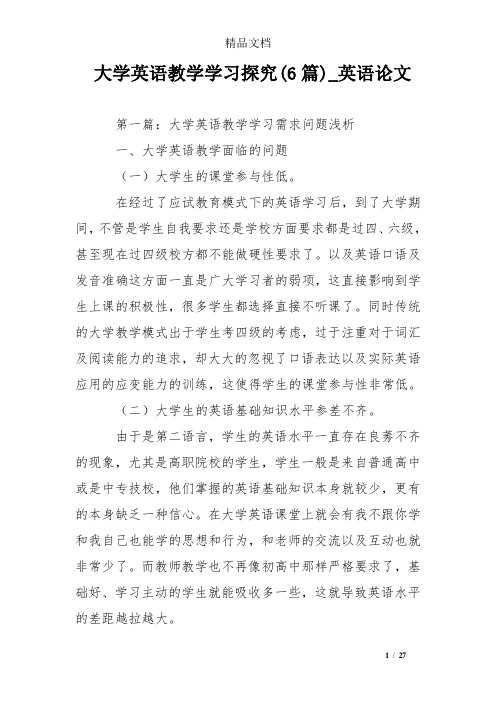
大学英语教学学习探究(6篇)_英语论文第一篇:大学英语教学学习需求问题浅析一、大学英语教学面临的问题(一)大学生的课堂参与性低。
在经过了应试教育模式下的英语学习后,到了大学期间,不管是学生自我要求还是学校方面要求都是过四、六级,甚至现在过四级校方都不能做硬性要求了。
以及英语口语及发音准确这方面一直是广大学习者的弱项,这直接影响到学生上课的积极性,很多学生都选择直接不听课了。
同时传统的大学教学模式出于学生考四级的考虑,过于注重对于词汇及阅读能力的追求,却大大的忽视了口语表达以及实际英语应用的应变能力的训练,这使得学生的课堂参与性非常低。
(二)大学生的英语基础知识水平参差不齐。
由于是第二语言,学生的英语水平一直存在良莠不齐的现象,尤其是高职院校的学生,学生一般是来自普通高中或是中专技校,他们掌握的英语基础知识本身就较少,更有的本身缺乏一种信心。
在大学英语课堂上就会有我不跟你学和我自己也能学的思想和行为,和老师的交流以及互动也就非常少了。
而教师教学也不再像初高中那样严格要求了,基础好、学习主动的学生就能吸收多一些,这就导致英语水平的差距越拉越大。
(三)大学英语老师保守的教学模式以及教学态度我们的第二语言学习很大程度上老师的作用是关键性的,但是在大学学校的英语老师很多时候都有一种敷衍了事的心态,认为大学的教学本来就是松散的,想学好的大学生完全有能力自己学习,对于那些不想学的完全没必要多费精力。
而且由于大部分英语老师去过以英语为母语的国家,很大程度上缺乏对于现代英语国家的思想观念的认识及对社会形势的掌握,教学还是以中国思维来进行,没有办法创造一个良好的英语的学习氛围和状态之中。
所以对于灵活的英语,老师仅仅传授课堂基本知识,还沿用国人职业化的教学模式,没办法更好的引导学生们积极学习二、学生学习需求视角的英语教学改革(一)学生对英语教师的需求大学生已有自己的价值观及判断力,所以他们在英语学习中对教师有着自己的要求:会对教师的基本功,知识的渊博及教学的灵活度一定的期望值,同时也更希望和教师建立良好的师生关系。

第1篇Abstract:This paper presents a case study of the English Research Group's efforts to enhance English language teaching through collaborative research and development. It outlines the group's objectives, methodologies, and outcomes, highlighting the impact of such activities on the quality of English education within our institution. The paper also discusses the challenges faced and the strategies employed to overcome them, offering insights into the process of continuous improvement in English language teaching.Introduction:In the ever-evolving field of education, the importance of research and development in English language teaching cannot be overstated. Our English Research Group, established with the aim of fostering excellence in English language teaching, has embarked on a journey of collaborative inquiry and innovation. This paper aims to document the group's activities, the methodologies employed, and the resultant outcomes, while also reflecting on the challenges encountered and the strategies implemented to address them.Objective:The primary objective of our English Research Group is to enhance the quality of English language teaching through collaborative research and development. This involves identifying areas of improvement, developing innovative teaching strategies, and promoting the integration of technology in English language learning.Methodology:Our research group operates on a multi-faceted approach to achieve its objectives:1. Literature Review: Members of the group conduct extensive literature reviews to stay updated on the latest trends and methodologies in English language teaching.2. Collaborative Workshops: Regular workshops are organized tofacilitate discussions on current challenges and to brainstorm innovative solutions.3. Classroom Observations: Observations of English language classes are conducted to identify teaching practices that can be improved or replicated.4. Action Research: Action research projects are initiated to implement and evaluate new teaching strategies.5. Technology Integration: The group explores ways to integrate technology into English language teaching to enhance student engagement and learning outcomes.Outcomes:The activities of our English Research Group have led to several notable outcomes:1. Improved Teaching Practices: Through collaborative discussions and observations, teachers have adopted more effective teaching methods, resulting in improved student performance.2. Enhanced Student Engagement: The integration of technology and innovative teaching strategies has increased student engagement and motivation.3. Teacher Development: Members of the group have gained new skills and knowledge through professional development activities, which have positively impacted their teaching practices.4. Publication of Research Findings: The group has published several articles and research papers, contributing to the body of knowledge in English language teaching.Challenges and Strategies:Despite the successes, the English Research Group has faced several challenges:1. Time Constraints: Limited time for research and developmentactivities can hinder progress.2. Resource Allocation: Insufficient resources can impede the implementation of new teaching strategies.3. Resistance to Change: Some teachers may resist adopting new methodologies due to comfort with traditional teaching practices.To address these challenges, the group has employed the following strategies:1. Time Management: Prioritizing research and development activities within the school calendar to ensure dedicated time for such endeavors.2. Resource Mobilization: Seeking external funding and partnerships to secure additional resources.3. Change Management: Encouraging a culture of openness to change through continuous communication and support.Conclusion:The English Research Group's efforts to enhance English language teaching through collaborative research and development have yielded significant benefits. By fostering a culture of inquiry, innovation, and continuous improvement, the group has contributed to the overall enhancement of English language education within our institution. The challenges faced have been overcome through strategic planning and effective communication. As the group continues its work, it is confident that it will continue to make a positive impact on the teaching and learning of English.References:[Please note that the following references are fictional and for illustrative purposes only.]1. Brown, H. D. (2018). Principles of Language Learning and Teaching(6th ed.). New York: Routledge.2. Harmer, J. (2007). The Practice of English Language Teaching (4th ed.). Essex: Pearson Education Limited.3. Little, D., & Norris, J. M. (2012). Language Policy and Planning in Education. New York: Routledge.4. Tomlinson, B. (2011). English Language Teaching in the 21st Century. Cambridge: Cambridge University Press.第2篇Abstract:This paper discusses the importance of collaborative research and development in the English Teaching and Research Group (ETRG) as a means to enhance the quality of English language teaching. Through a comprehensive analysis of the activities and outcomes of the ETRG, this paper highlights the impact of collective efforts on teacher professional development, curriculum innovation, and student learning outcomes. The paper concludes by emphasizing the need for ongoing collaboration and continuous improvement in English language teaching practices.Introduction:The English language has become an indispensable tool in today's globalized world. As a result, the demand for high-quality English language teaching has increased significantly. The English Teaching and Research Group (ETRG) is a collective of educators dedicated to the improvement of English language teaching through collaborative research and development. This paper aims to explore the activities, strategies, and outcomes of the ETRG, with a focus on its role in enhancing the quality of English language teaching.I. Background and Objectives1.1 BackgroundThe ETRG was established with the objective of promoting excellence in English language teaching and research within the educational community.The group comprises experienced teachers, language specialists, and educational administrators who share a common vision for enhancing the teaching and learning of English.1.2 ObjectivesThe primary objectives of the ETRG are as follows:- To facilitate collaborative research and development in English language teaching.- To foster a culture of continuous professional development among English language teachers.- To innovate curriculum design and pedagogical approaches to improve student learning outcomes.- To share best practices and resources among members to enhance teaching effectiveness.II. Activities of the English Teaching and Research Group2.1 Collaborative Research ProjectsThe ETRG encourages members to engage in collaborative research projects that explore various aspects of English language teaching. Theseprojects may involve investigating new teaching methods, analyzing student learning outcomes, or exploring the effectiveness of different curriculum approaches.2.2 Workshops and SeminarsThe group organizes regular workshops and seminars to provide opportunities for teachers to enhance their professional skills. These events feature guest speakers, presentations, and discussions on current trends in English language teaching.2.3 Curriculum DevelopmentThe ETRG plays a pivotal role in the development and revision of English language curricula. Members collaborate to create innovative and engaging course materials that cater to the diverse needs of students.2.4 Resource SharingThe ETRG facilitates the sharing of teaching resources among its members. This includes lesson plans, assessment tools, and digital materials that can be adapted and utilized in different teaching contexts.III. Impact of the English Teaching and Research Group3.1 Teacher Professional DevelopmentThe collaborative nature of the ETRG has significantly contributed tothe professional development of its members. Through participation in research projects, workshops, and seminars, teachers have gained new insights into effective teaching practices and have developed a deeper understanding of language acquisition theories.3.2 Curriculum InnovationThe ETRG's involvement in curriculum development has led to the implementation of innovative teaching methods and resources. This has resulted in more engaging and interactive classrooms, which have positively impacted student learning outcomes.3.3 Student Learning OutcomesThe enhanced teaching practices and resources developed by the ETRG have contributed to improved student learning outcomes. Students have shown increased engagement, improved language proficiency, and better overall academic performance.IV. Challenges and Future Directions4.1 ChallengesDespite the success of the ETRG, several challenges persist. These include limited resources, time constraints, and the need for ongoing professional development support.4.2 Future DirectionsTo address these challenges, the ETRG should focus on the followingfuture directions:- Strengthening collaboration with educational institutions and stakeholders.- Expanding access to professional development opportunities for teachers.- Developing a comprehensive framework for evaluating the impact of ETRG activities on English language teaching.Conclusion:The English Teaching and Research Group has played a crucial role in enhancing the quality of English language teaching through collaborative research and development. By fostering a culture of continuous improvement and innovation, the ETRG has contributed to the professional growth of its members and the academic success of students. As the demand for high-quality English language teaching continues to grow, the ETRG's commitment to collaboration and improvement remains essential for the future of English language education.第3篇Abstract:This paper discusses the importance of collaborative research and development within an English language teaching (ELT) research group. It outlines the objectives, methodologies, and outcomes of a recent教研活动, highlighting the significance of such initiatives in improving the quality of ELT in our institution. The paper also reflects on the challenges faced during the activity and proposes strategies for future improvement.Introduction:The English language has become an indispensable tool in the globalized world, and the demand for effective English language teaching and learning has never been greater. In response to this demand, educational institutions worldwide have established English language teaching research groups to foster collaboration, share best practices, and develop innovative teaching methods. This paper presents the experiencesand outcomes of a recent English教研组教研活动, focusing on the collaborative efforts of the group in enhancing the quality of ELT.Objectives:The primary objectives of the English教研组教研活动 were as follows:1. To foster collaboration among teachers, enabling them to share insights, experiences, and expertise.2. To identify areas of improvement in ELT practices within the institution.3. To develop and implement innovative teaching strategies that promote student engagement and learning outcomes.4. To enhance the professional development of English language teachers through continuous learning and reflection.Methodology:The English教研组教研活动采用以下方法:1. Workshops: Conducted workshops on various topics such as flipped classroom, project-based learning, and technology integration in ELT.2. Case studies: Analyzed case studies of successful ELT programs from other institutions to identify best practices.3. Peer observations: Conducted peer observations of teaching sessions to provide constructive feedback and identify areas for improvement.4. Action research: Engaged in action research projects to address specific challenges faced by the group.Outcomes:The English教研组教研活动取得了以下成果:1. Enhanced collaboration: Teachers developed a stronger sense of community, sharing ideas and resources to improve their teaching practices.2. Identification of areas for improvement: The group identified several areas where ELT practices could be improved, such as classroom management, assessment methods, and student engagement.3. Development of innovative teaching strategies: Teachers developed and implemented new teaching strategies, such as the flipped classroom model and project-based learning, which improved student engagement and learning outcomes.4. Professional development: Teachers engaged in continuous learning and reflection, leading to an improvement in their teaching skills and confidence.Challenges and Reflections:Despite the positive outcomes, the English教研组教研活动也面临了一些挑战:1. Time constraints: Teachers often struggle to find time for collaborative activities and professional development amidst their busy schedules.2. Diverse teaching styles: The group consisted of teachers with diverse teaching styles and backgrounds, which sometimes made it difficult to reach a consensus on best practices.3. Resistance to change: Some teachers were hesitant to adopt new teaching methods, fearing that it would disrupt their established routines.To address these challenges, the following strategies were proposed:1. Scheduling dedicated time for collaborative activities and professional development.2. Facilitating discussions and training sessions to encourage teachers to share their experiences and ideas.3. Providing support and resources to help teachers adapt to new teaching methods and technologies.Conclusion:The English教研组教研活动为提升我校英语教学质量提供了宝贵的经验和启示。
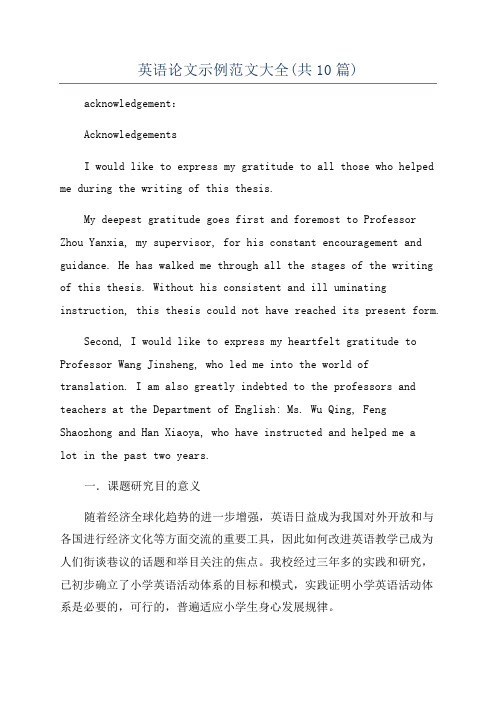
英语论文示例范文大全(共10篇)acknowledgement:AcknowledgementsI would like to express my gratitude to all those who helped me during the writing of this thesis.My deepest gratitude goes first and foremost to Professor Zhou Yanxia, my supervisor, for his constant encouragement and guidance. He has walked me through all the stages of the writing of this thesis. Without his consistent and ill uminating instruction, this thesis could not have reached its present form.Second, I would like to express my heartfelt gratitude to Professor Wang Jinsheng, who led me into the world of translation. I am also greatly indebted to the professors and teachers at the Department of English: Ms. Wu Qing, Feng Shaozhong and Han Xiaoya, who have instructed and helped me alot in the past two years.一.课题研究目的意义随着经济全球化趋势的进一步增强,英语日益成为我国对外开放和与各国进行经济文化等方面交流的重要工具,因此如何改进英语教学已成为人们街谈巷议的话题和举目关注的焦点。

高中英语教学论文10篇完美版引言本文旨在介绍十篇高中英语教学论文的完美版,这些论文涵盖了多个主题,旨在提供丰富多样的教学方法和策略,以帮助教师提高教学质量。
论文一:利用多媒体技术改善英语听说能力这篇论文探讨了如何利用多媒体技术来增强学生的英语听说能力。
论文提出了一些有效的教学策略和方法,例如使用影片、音频和互动游戏等多媒体资源。
论文二:运用情境教学法提高高中生的英语写作能力该论文研究了使用情境教学法来提高高中生英语写作能力的有效性。
论文介绍了一些实用的教学活动和案例,以帮助学生在真实场景中进行写作训练。
论文三:文化教育在高中英语课堂中的应用这篇论文讨论了文化教育在高中英语课堂中的重要性和应用。
论文介绍了一些培养学生跨文化交流能力的教学方法和实践经验。
论文四:提高高中英语听力理解的策略总结该论文总结了一些有效的策略,可帮助教师提高高中生的英语听力理解能力。
论文探讨了词汇研究、语调训练和听力材料选择等方面的教学策略。
论文五:游戏教学法在高中英语课堂中的应用这篇论文研究了游戏教学法在高中英语课堂中的应用。
论文介绍了一些以游戏为基础的教学活动和案例,以提高学生的英语研究兴趣和参与度。
论文六:利用小组探究研究提高高中英语口语表达能力该论文探讨了如何利用小组探究研究来提高高中生的英语口语表达能力。
论文介绍了小组合作研究的重要性,以及一些可行的活动和方法。
论文七:分享课堂故事以提高学生的听说能力这篇论文提到了通过分享课堂故事来提高学生的英语听说能力。
论文介绍了如何运用故事教学法和相关教学活动,激发学生的研究兴趣和提高语言表达能力。
论文八:使用影片剪辑提高高中生的英语听力水平该论文研究了使用影片剪辑来提高高中生英语听力水平的有效性。
论文介绍了如何选择合适的影片剪辑、设计相关听力任务,并给出了实施建议。
论文九:创意写作在高中英语课堂中的应用这篇论文探讨了创意写作在高中英语课堂中的应用。
论文介绍了一些创意写作的活动和方法,鼓励学生发挥想象力,提高写作质量。
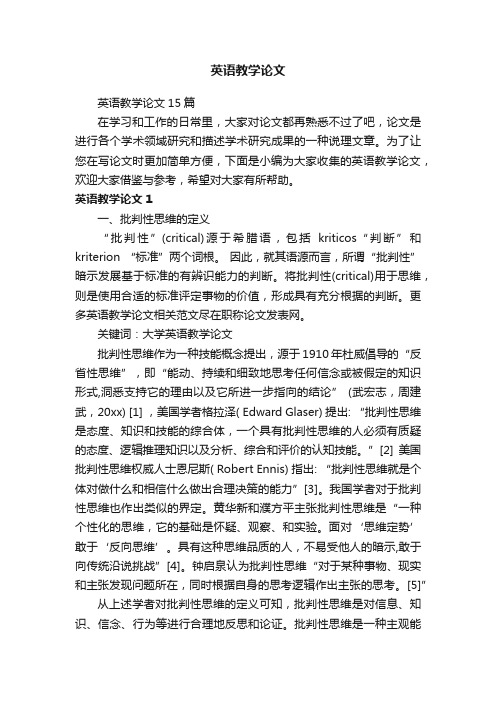
英语教学论文英语教学论文15篇在学习和工作的日常里,大家对论文都再熟悉不过了吧,论文是进行各个学术领域研究和描述学术研究成果的一种说理文章。
为了让您在写论文时更加简单方便,下面是小编为大家收集的英语教学论文,欢迎大家借鉴与参考,希望对大家有所帮助。
英语教学论文1一、批判性思维的定义“批判性”(critical)源于希腊语,包括kriticos“判断”和kriterion “标准”两个词根。
因此,就其语源而言,所谓“批判性”暗示发展基于标准的有辨识能力的判断。
将批判性(critical)用于思维,则是使用合适的标准评定事物的价值,形成具有充分根据的判断。
更多英语教学论文相关范文尽在职称论文发表网。
关键词:大学英语教学论文批判性思维作为一种技能概念提出,源于1910年杜威倡导的“反省性思维”,即“能动、持续和细致地思考任何信念或被假定的知识形式,洞悉支持它的理由以及它所进一步指向的结论” (武宏志,周建武,20xx) [1] ,美国学者格拉泽( Edward Glaser) 提出: “批判性思维是态度、知识和技能的综合体,一个具有批判性思维的人必须有质疑的态度、逻辑推理知识以及分析、综合和评价的认知技能。
”[2] 美国批判性思维权威人士恩尼斯( Robert Ennis) 指出: “批判性思维就是个体对做什么和相信什么做出合理决策的能力”[3]。
我国学者对于批判性思维也作出类似的界定。
黄华新和濮方平主张批判性思维是“一种个性化的思维,它的基础是怀疑、观察、和实验。
面对‘思维定势’敢于‘反向思维’。
具有这种思维品质的人,不易受他人的暗示,敢于向传统沿说挑战”[4]。
钟启泉认为批判性思维“对于某种事物、现实和主张发现问题所在,同时根据自身的思考逻辑作出主张的思考。
[5]”从上述学者对批判性思维的定义可知,批判性思维是对信息、知识、信念、行为等进行合理地反思和论证。
批判性思维是一种主观能动的反思倾向和能力。
高校英语教学研究论文10篇第一篇:高校网络英语教学问题分析随着教育事业的发展和新课程改革的不断深入,利用网络技术进行教学改革成为学校教育发展的必然方向。
高校英语教学积极重视网络技术在教学中的作用,开展网络英语教学。
虽然,高校的网络教学已取得巨大进步,但是由于网络教学发展时间较短,缺乏丰富的实践经验,高校网络英语教学中仍存在着一系列问题需要我们加以重视,并积极探索科学的解决策略。
分析高校网络英语教学中最常的问题不仅有利于促进高校网络英语教学的发展,而且对高校的新课程改革有着深刻的现实意义。
1高校网络英语教学中存在的问题1.1教学理念落后由于受传统教学理念的影响,高校网络英语教学理念之后。
首先,部分高校的网络英语教学缺乏对网络教学的认识,无法为网络英语教学提供系统的理论指导。
有些高校在网络技术及网络英语教学软件、教学网站等方面都缺乏系统的理论指导。
同时,国外的网络教学理论和实验发展比较迅速,而我国高校的网络英语教学缺乏对国外理论和实践的学习与借鉴;其次,高校的网络英语教学缺乏现代化的教育观念,在英语教学的过程中,很大程度上只注重英语知识的传授,缺乏对信息化和现代化的重视。
1.2缺乏专业人才目前,我国高校的网络英语教学缺乏计算机专业人才与英语人才相结合的符合性人才。
大高校的大多数英语教师缺乏系统的计算机教育,无法充分发挥计算机技术在网络英语教学中的作用。
同时,高校的计算机专业教师又缺乏完善的英语专业知识。
英语专业人才与计算机人才相分离,导致高校的网络英语课程无法顺利开展。
1.3资源利用率低首先,高校的网络英语教学缺乏对信息化的教育资源的整合,导致网络英语教师缺乏优势。
虽然,各高校积极重视网络技术在教学活动中的作用,并积极建设校园网。
但是,各高校的校园网都是相互独立的,资源和信息不能相互沟通,导致高校网络英语教学资源利用率太低;其次,高校的网络建设并不是为促进教学活动的开展,而是为了符合国家的相关要求而配置的。
很多高校的网络建设相当于摆设;最后,高校的网络英语教学应受传统应试教育的影响,其课堂设计仍采用题海战术,缺乏对新的教学方法及网络教学资源的利用。
2高校网络英语教学策略2.1学校方面2.1.1更新教学理念。
高校应积极更新教学理念,改进传统的应试教育观念。
在网络英语教学中,充分尊重学生的主体地位,着重培养学生的自主学习能力。
同时,高校的网络英语教学应加强学生的实践锻炼,培养学生的思维能力、分析能力和创新能力,提高学生的综合素质。
2.1.2培养专业人才高校的网络英语教学应积极培养专业人才。
为此,高校应积极引进高素质、复合型人才,保证人才的信息技术和英语专业技能,提高高校网络英语教学水平。
同时,高校应积极培养现有教师的信息技能,组织教师定期参加信息技能培训,完善教师的计算机知识结构,提高教师的教学水平。
2.1.3注重教学质量高校网络英语教学应注重教学质量的提升。
为此,高校应积极鼓励英语教师根据学生的心理特征和知识需求,创新教学方法,积极丰富教学内容,激发学生学习英语知识的积极性,进而提高网络英语教学的质量。
2.2教师方面2.2.1提高信息技能信息技能是开展网络英语教学的前提。
因此,高校网络英语教学应着提高教师的信息技能。
为此,学校应积极教育教师树立终身学习的观念,做到与时俱进,积极接受新知识和新事物,不断学习计算机知识,提高自身的信息技能。
2.2.2提升综合素质一方面,高校应积极重视教师职业道德的培养和责任心的增强,使教师严格按照教师职业道德开展网络英语教学,提高教师行为的科学性和合理性。
另一方面,高校应积极重视培养教师的媒介素养,使教师拥有较高的信息辨别能力,能够正确筛选符合英语教学的网络资源,熟练使用网络技术开展网络英语教学。
2.2.3提高教学质量教学质量是进行教学评估的重要参考依据。
因此,高校网络英语教学应积极重视教师教学质量的提升。
为此,高校应积极鼓励教师根据学生的个性特征,探索科学合理的教学方法,以提高教学质量。
同时,教师应积极借鉴成功的网络英语教学经验,并将成功经验与现实状况相结合,实现高质量教学。
2.3学生方面2.3.1端正学习态度学生在学习中居于主体地位,其学习态度对学习效果有着直接影响。
因此,高校的网络英语教学应端正学生的学习态度。
为此,高校应积极宣传网络英语教学的优势,加强学生对网络英语教学的认识,提高学生对网络英语教学的信任程度,教育学生以端正的态度对待网络英语教学,鼓励学生积极参与网络英语学习。
2.3.2培养媒介素养网络英语教学要求学生具有较高的媒介素养。
因此,高校的网络英语教学应积极培养学生的媒介素养。
为此,学校应加强学生的网络道德教育,增强学生的信息筛选能力,教育学生自觉抵制网络上出现的不良诱惑和不良信息,使学生自觉做到正确使用网络进行英语学习。
3小结随着教育事业的发展和科学技术的不断进步,网络技术在教学中的应用越来越广泛。
高校英语教学积极重视网络技术在教学中的作用,开展网络英语教学。
但是,由于受传统教学模式的影响,高校网络教学中扔存在着教学理念落后、缺乏专业人才、资源利用率低等问题。
为促进高校网络英语教学的发展,必须加强学校、教师和学生的配合。
高校应更新教学理念、培养专业人才、注重教学质量。
英语教师应提高信息技能、提升综合素质、提高教学质量。
学生应端正学习态度、培养媒介素养、积极利用网络资源。
促进高校网络英语教学对高校教学改革及高校人才培养有着重要意义。
参考文献:[1]黄慧,陈兢.多媒体网络英语教学的新发展——与建构主义的整合[J].江西师范大学学报(哲学社会科学版),2011(03).[2]周亮.多媒体计算机技术与高校英语教学的整合[J].当代教育实践与教学研究,2016(07).第二篇:翻转课堂在民办高校大学英语教学中的运用摘要:该文首先对民办高校目前的英语教学现状进行了分析,然后引用备受关注的翻转课堂的教学模式及其在民办高校实施的可行性进行深入研究,旨在提升英语基础较为薄弱的民办高校学生自主学习的能力,解决民办高校英语教学效率低下的问题,翻转课堂或将成为未来英语教学发展的趋势。
关键词:民办高校;英语教学;翻转课堂1民办高校大学英语教学现状作为在民办高校从事英语教学10余年的老师,对哈尔滨远东理工学院学生的英语学习状况相当了解。
学生入学成绩参差不齐,英语成绩更是凸显不足。
曾经对于2015级入学新生进行了英语摸底测验,成绩不甚理想,大多数同学竟然无法超越高考成绩甚至有的远低于高考英语成绩,尽管学院已采取了A,B,C班按成绩进行分级教学,但是面对学生庞大的基数,层次水平太过分散,教研室也只能以大体相同的教学进度来应对各种不同的学生,而无法适应这种学习进度和风格的人,就会变为表面努力实则已放弃的差生。
无法否认的是,民办高校存在教学效率低、教师积极性不高、缺乏师生交流互动等问题,而且重复式、灌输式的低水平传统教学模式阻碍了学生学习的主动性和创新性,自主学习和自控能力相当薄弱,使得学生花费多年学习,仍然无法开口用英语对话,国家四六级考试过级率极低,造成了教学效果的恶性循环。
同时,重复不变的教材内容也缺乏挑战性,相当枯燥乏味,无法促进教师专业知识的增长,急需改变民办高校大学英语教学相对滞后的现状。
2什么是翻转课堂由于传统教学模式的弊端,翻转课堂于2011年在美国兴起,主要是以日益先进的多媒体技术为依托,转变教师的“教”与学生的“学”的角色位置,教师将教学资料以视频、课件、微课等形式登在网站,学生自行下载观看,突破时空限制,达到预期预习效果之后,学生可以带着问题在课堂上向教师请教并且和同学互相交流来完成知识的内化。
这种学习方式与传统的教学方式正好相反,所以被称为翻转课堂。
3翻转课堂在民办高校实施的可行性研究哈尔滨远东理工学院,作为国家教育部批准的民办普通高校,在学院领导的鼓励下,十分重视学院学生英语成绩的提升和英语四六级等国家级考试合格率的提高,先后采取了不同的教学手段来提升英语成绩。
例如:根据学生的高考入学英语成绩进行摸底考试,按照实际成绩分为优班、普通班和艺术特长班,采取不同的教学进度,分配不同的师资力量。
在考级之前组织由专门教师讲解的四六级强化辅导班,印发相关练习资料。
对学习成绩好,有志向考取研究生的学生进行拔尖创新人才培养,集中强化考研英语成绩等,取得了一些效果。
但是这些努力只是意志坚定的个别学生受益,实施过程仍然吃力,收效十分不明显。
因此,经过无数次集体备课和教研室活动讨论,认为翻转课堂还是比较适合民办学校英语教育的新型教学方案。
具体来讲,其积极作用主要体现在以下几个方面。
3.1有利于提高学生自主学习的能力,增加学习积极性,提高学习兴趣随着校园网络和学生个人电脑、智能手机和移动电子设备的普遍应用,学生可以通过校园网络获取下载教师每堂课的视频资源,为翻转课堂的教学模式提供了硬件支持。
学生一般对于黑板粉笔等传统的教学模式缺乏吸引力,根本无法实现主动学习,而充满色彩和动画的视频微课资源往往更吸引学生的眼球。
学生可以根据自身的情况选择适合的视频资源,通过暂停、回放等来掌握知识,基础薄弱的同学可以播放数次以达到学会的效果,增加了学生学习的兴趣和自信心,不必担心自身跟不上进度,因为当堂反应慢而放弃自己。
学生之间也可通过QQ或者微信群等交流工具相互学习,分享学习心得和体会,在线提交作业,并能及时得到教师直接的反馈意见。
让学生觉得教师重视自己,并且可以大胆地在线询问一些自己在课堂上不敢问的问题,完全没有必要担心其他同学质疑的眼神和嘲笑的反应,更有效地建立了师生互动关系,增进了师生感情。
此外,部分学生因故不能及时上课,也可以通过翻转课堂的平台及时弥补缺失的课程,完成课后作业,随时了解和掌握学习的进度,避免了很多不便。
按照教学流程,学生可以在上课前根据自身的情况主动观看视频资源并调整观看次数来实现预习任务,记录好疑难问题,在课堂上带着问题参与师生互动,便可不至于“鸭子听雷”什么都不懂,也插不上嘴。
在时间安排上也没有时间空间的限制,学生有了更多的自由决定权。
在课堂上可让学生分组讨论,口头报告学习心得和疑问,加强协作表现,创新和思辨能力。
课下积极完成课后练习,教师对其进行个性化评价反馈。
课堂时间毕竟是有限的,此种方法可以杜绝以教师“教”为主导的“满堂灌”的教学模式,使学生真正成为学习的主人。
3.2有利于提高教师的教学积极性和创新性民办院校的师资队伍情况呈现出两极化分布,具有高级职称的老教师数量很少,而中青年教师基数大往往成为教学的中坚力量。
中青年教师一般都能掌握并更快接受多媒体网络教学的相关知识,然而长期以来传统枯燥的板书教学模式已经磨灭了教师的积极性和创新性,使多媒体课件制作等技能变得越来越生疏。
翻转课堂强调的是学生学习的自主性,把教师的讲解压缩在课前教学视频中,但这并不意味着教师课堂上会变得轻松,工作量会减少,相反,翻转课堂的出现给老师们带来了极大地挑战,同时也产生了努力的压力和动力。